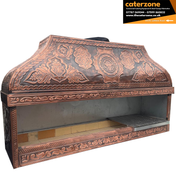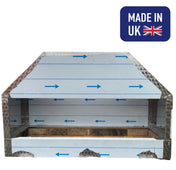Is Bulk Buying Catering Equipment Worth It? Complete Guide
Searching for the best catering equipment for your restaurant or food service company is no easy feat. Buying your supplies in bulk is a good practice because it will allow you to keep costs under control and purchase high-quality kitchen appliances.
At Caterzone, we know that purchasing affordable and reliable kitchen supplies and equipment can be a big challenge for any restaurant or foodservice business. That is why it’s so important to carefully consider the advantages and disadvantages of bulk buying and thoroughly research your purchasing decision, which will allow you to pick the best wholesale kitchen equipment and reduce your costs in the long term.
Ins and Outs of Wholesale Commercial Kitchen Equipment
Investigating the ins and outs of wholesale commercial kitchen equipment means looking at this subject from different angles and taking a very pragmatic and calculated approach. Restaurants, catering companies, and professional kitchens all need high-quality equipment in order to be able to cook and serve delicious food to their customers. The right wholesale purchase is an investment that can allow a kitchen to operate more efficiently and effectively.
It’s important to thoroughly research your kitchen’s needs, what quality means to you, and what long-term benefits you want to achieve before you go out and buy wholesale catering supplies.
Types of Kitchen Equipment for Wholesale Purchases
- Commercial ovens and ranges
- Industrial refrigeration units
- Stainless steel preparation tables
- Heavy-duty mixers and blenders
- Commercial dishwashing equipment
Standards of Quality in Catering Supplies
Selecting wholesale catering supplies also means going in search of durability, performance, and compliance with industry standards. Choosing to work with a supplier like Caterzone means you get access to some of the highest-quality catering equipment, which can meet the highest standards of a professional kitchen.
Popular Bulk Purchase Categories
- Cooking equipment
- Food preparation tools
- Storage and refrigeration equipment
- Cleaning and sanitation supplies
- Smallwares and utensils
Financial Advantages of Buying Kitchen Appliances in Bulk
Buying kitchen equipment in bulk is one of the things a restaurant or a catering company can do to significantly reduce its expenses. This fiscally smart decision will help a business control its costs and turn a profit.
Benefits of Bulk-Buying
- Lower price per unit for bulk purchases
- Less long-term replacement costs for equipment
- Better cash flow management
- Potential tax benefits on capital investments
Inventory Assessment
- Assess current equipment inventory
- Bulk vs. individual purchase pricing comparison
- Storage and maintenance capability assessment
- Long-term cost-saving projections
Buying in Bulk: Is It Worth It?
Buying catering equipment in bulk is a major decision for any business, so a company should never take it lightly. Before making such a large purchasing decision, it’s imperative to plan and research the pro’s and cons of the situation.
Storage Needs and Factors
- Available space in the warehouse or storage facility
- Temperature-controlled environment, if needed
- Proper shelving and organization systems
- Stock management tools and resources
Maintenance and Equipment’s Long-Term Value
- Establish a regular maintenance schedule for equipment
- Plan for preventative maintenance before equipment failure
- Evaluate warranties and service agreements
- Availability of parts and service
Risk Assessment and Management
Bulk-buying decisions are always associated with a certain degree of risk, which is why it’s of great importance for a business to be aware of all the potential pitfalls that can occur. The bulk-buying decisions a business makes need to be handled with care, so companies need to be ready for any market fluctuations, new technologies, and food trends to avoid any major financial losses down the road.
Conclusion
Buying wholesale commercial kitchen equipment is no small task. It takes a significant amount of planning and an in-depth analysis to make an informed decision about which items are worth the investment. Businesses in the food service industry need to be ready to consider the possibility of cost savings as well as all the challenges associated with this practice.
Buying in bulk can allow a company to save a massive amount of money, but it’s vital that a business orders only the equipment they need for their specific operation. Buying affordable restaurant supplies is an essential part of any food service business that’s looking to run as efficiently as possible.
Buying in bulk also requires a business to have strong storage, maintenance, and long-term value of the equipment. Business owners and managers are highly advised to think long and hard about all potential risks and to plan long-term before they make any bulk-buying decisions.
Partnering with a reliable supplier, such as Caterzone, can be a great way to make this process as simple as possible. Our expert advice will help you make the best large-purchasing decisions for your business. It’s important to be flexible and willing to adapt based on your specific needs and your available budget when you shop for wholesale kitchen equipment.
Buying catering equipment in bulk is not an investment that every business will be able to make. Restaurants, cafes, and catering companies all need to take their time and do their research in order to find out what they can and can’t afford according to their specific goals and budget.
FAQ
-
What are the primary advantages of bulk purchasing catering equipment?
Buying catering equipment in bulk reduces the cost per item, simplifies the purchasing process, and makes it easier for a business to ensure consistent quality. Partnering with a supplier such as Caterzone also means you will always get the best deals and be able to maintain consistent stock levels. -
How can I know if buying in bulk is suitable for my catering business?
It’s important to check your budget, storage capacity, and frequency of use. Calculate how much you could potentially save when compared to individual purchases and contact Caterzone’s sales team for expert advice on making the right bulk-buying decision. -
What types of catering equipment are best for bulk purchasing?
Durable appliances, standard cookware, and commercial utensils are all great options for bulk buying. Disposable products are also ideal for bulk purchasing. Caterzone also offers a wide range of wholesale kitchen supplies for every category in your restaurant. -
Are there quality risks in bulk equipment purchasing?
Yes, there are some quality risks in bulk purchasing, but they’re significantly lower when you work with a reputable supplier like Caterzone. Always double-check the quality, request certifications, and ask for samples before you make an order. Choose suppliers who have established quality control measures and warranties. -
How can I manage the storage of bulk catering equipment purchases?
It’s important to plan your storage space, taking into account the environment and organization. Use appropriate storage solutions and stock management strategies. Contact Caterzone’s sales team for advice on storing different types of equipment. -
What financial aspects should I consider before bulk purchasing?
You need to evaluate your cash flow and how much you will be able to save over time. Calculate all the costs you will incur, including maintenance and storage. Don’t forget to calculate potential taxes on large investments. -
Can I customize bulk orders with Caterzone?
Yes, you can. Caterzone also offers customization options, which means you can tailor the entire order to your specific needs. Contact our sales team to discuss your custom orders and get pricing information. Caterzone can also work with you on creating a custom package that will meet the needs of your business. -
What are important maintenance considerations for bulk-purchased equipment?
It’s essential to develop a maintenance schedule, train employees, and perform regular equipment inspections. Consider warranties, the availability of spare parts, and any potential service requirements. Always choose durable and reliable equipment if you want to maximize value.



